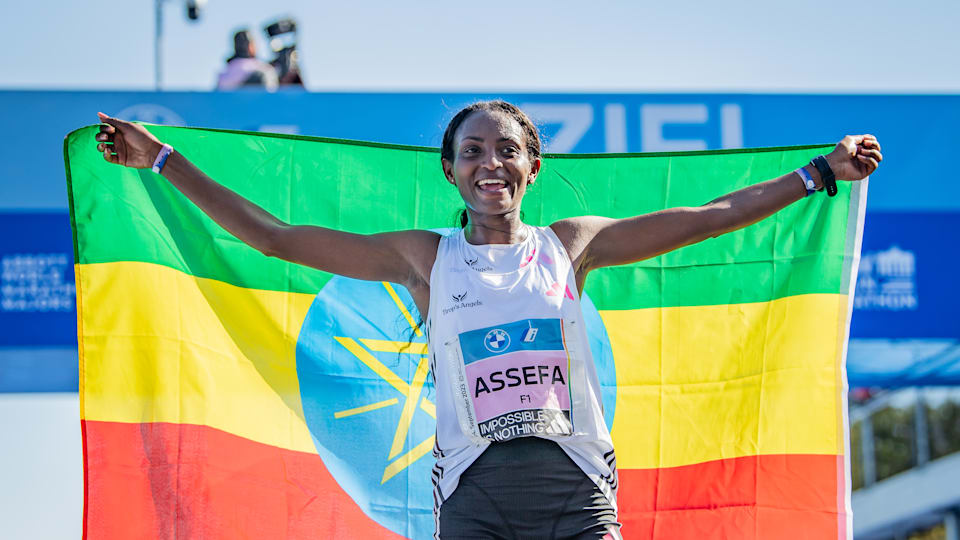2024 London Marathon: The rise and rise of women's marathon world record holder Tigst Assefa

Tigst Assefa's rise has been almost as rapid as the breathtaking women's marathon world record the athlete secured at the Berlin Marathon in September 2023.
The blistering time of two hours 11 minutes and 53 seconds completed in the 42.195 kilometres (26.219 miles) distance smashed the previous record of 2:14.04 secured by Kenya's Brigid Kosgei at the 2019 Chicago Marathon, by more than two minutes.
All this in only Assefa's third-ever marathon distance event.
Immediately after the race and speaking through a translator, Assefa acknowledged that she was hoping to break the world record "in some form", but that she "broke the record with such a result was not expected for me".
It took seven days for Assefa – who was wearing new so-called super shoes during the history-making moment – to collect herself and post a response on social media: "I still can’t believe what happened just over a week ago."
The athlete who would go on to be a World Athlete of the Year nominee for 2023, then offered thanks to all who had helped on her journey, including, "everyone that cheered me on the course".
A line break in the paragraphs on the post before:
"In just a few more days I will start working on my next goal!"
What's next, asks Tigst Assefa after world record
Of course, an athlete looks forward, ever forward, with Assefa's 'next goal' as of writing, a debut at the 2024 London Marathon on 21 April, followed by a hoped-for selection for Paris 2024 by the Ethiopian Olympic Committee.
It would be especially fitting if a remarkable athlete who has broken two major marks in women's running – the first to break 2:20 in the marathon as well as, in a former life as an 800m runner, the magic two-minute mark – was to win in Paris.
Not only will the women's marathon close the Olympic Games Paris 2024 on 11 August – a reversal of previous practice in which the men's edition was the last event, now taking place the day before – but the route has been chosen as a tribute to women.
The course is a reference to a key turning point in the French Revolution in which crowds of Parisian market women marched on Versailles on 5 October 1789, demanding reform, particularly in reaction to food scarcity.
So, an emotive moment for whoever wins, but for Assefa, it would be another iconic milestone in her still-young marathon career.
But how did she get here? What's her story?
- As National Olympic Committees have the exclusive authority for the representation of their respective countries at the Olympic Games, athletes' participation at the Paris Games depends on their NOC selecting them to represent their delegation at Paris 2024. Click here to see the official qualification system for each sport.
London Marathon 2024: Preview, schedule, how to watch top runners in elite races live
Tigst Assefa, what came before
Assefa started her athletics life as an 800m runner, competing at Rio 2016 as a teenager for her nation, gaining experience despite not making it through the qualifying rounds.
But an ongoing Achilles tendon injury forced a rethink, with a switch to the road necessary after being unable to continue running in spikes.
A two-year break followed to heal up, with a 10k debut in Dubai in 2018, completed in 34:35. In 2019, she improved that time by nearly three minutes, and by December 2019 had debuted in the half marathon distance, running 1:08:25 in Valencia, Spain.
A further two-year hiatus followed due to the global pandemic but a return to training under coach Gemedu Dedefo, who leads a group of athletes in Addis Ababa including 2022 men's world champion Tamirat Tola, helped preparations for Assefa's marathon debut in March 2022.
This first marathon, in Riyadh, Saudi Arabia, was inauspicious, with Assefa completing the distance – despite not being fully fit – in a time of 2:34.01.
Six months later and an event-topping time of 2:15.37 secured the win at her debut Berlin Marathon – with the third fastest time in history.
Prior to that run, Assefa's coach had said: “‘Tigst is beating all the course records of training courses and I never saw a woman running like that'."
The following year, Assefa became the fastest woman ever, putting the mark down to "a result of hard working, which I have done for the last year".
Asked if the result now makes her favourite for Paris, Assefa was circumspect:
"The decision lies in the hands of the committee members," she said, "but I have set a point now, which will not be ignored, and so I hope I will participate in the Olympic Games in Paris."